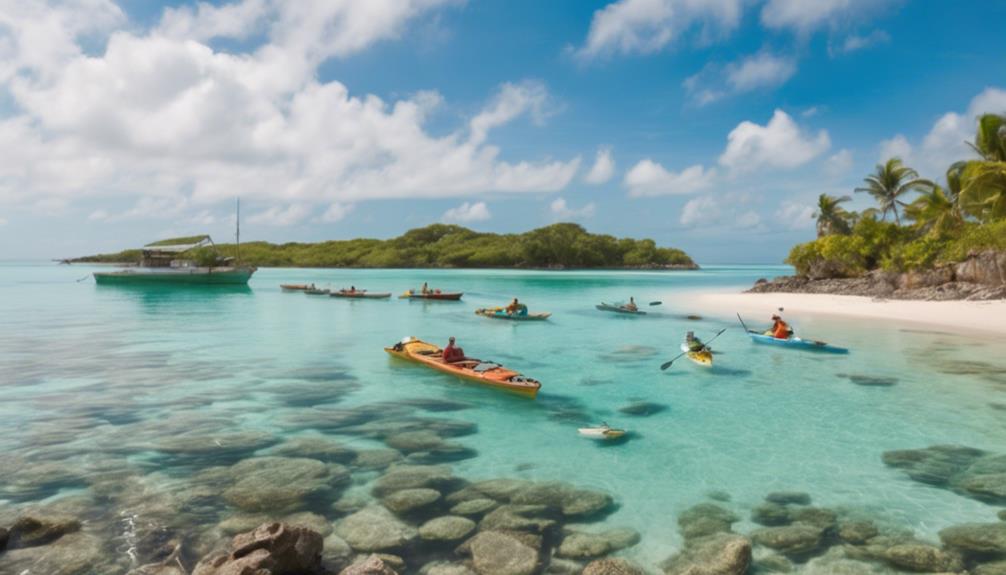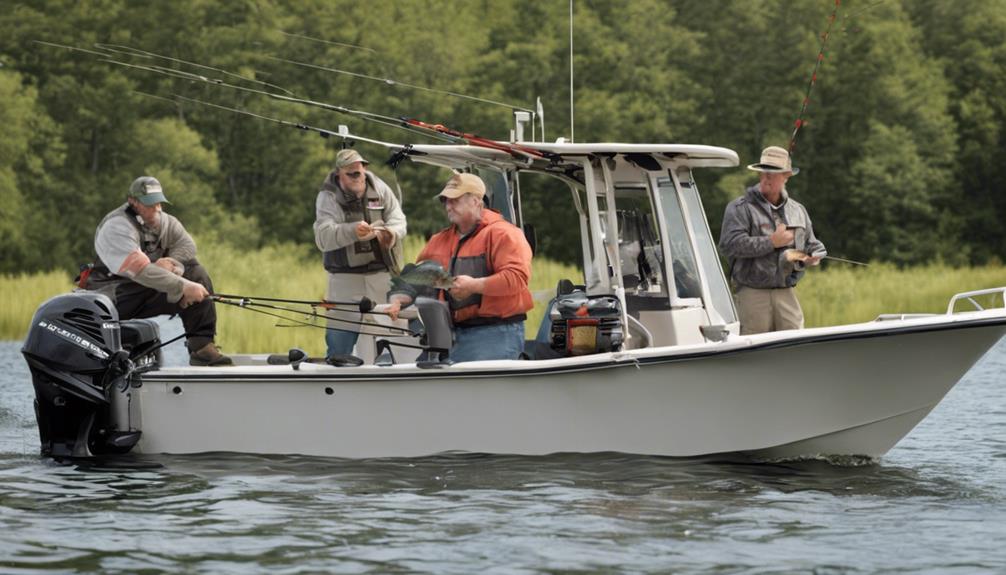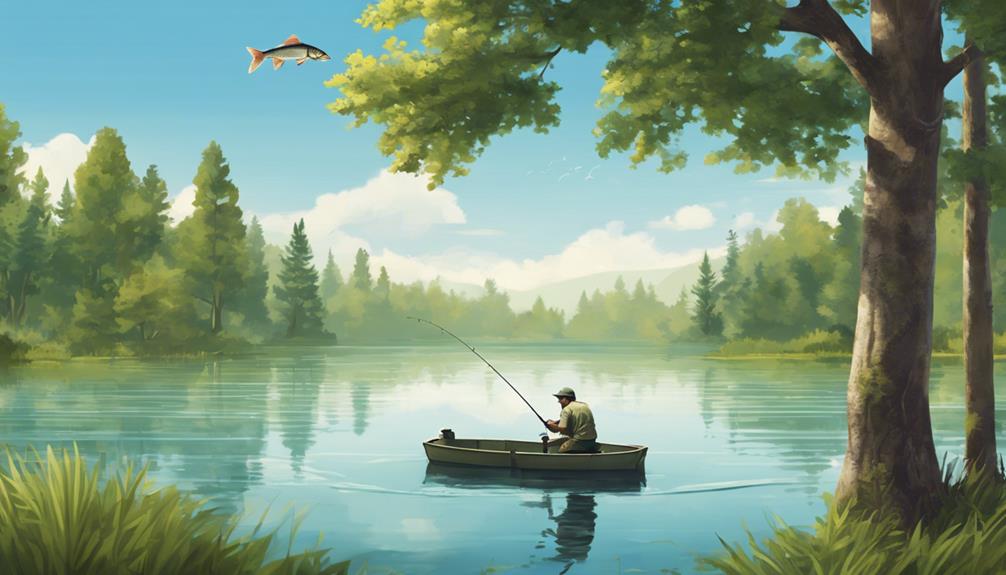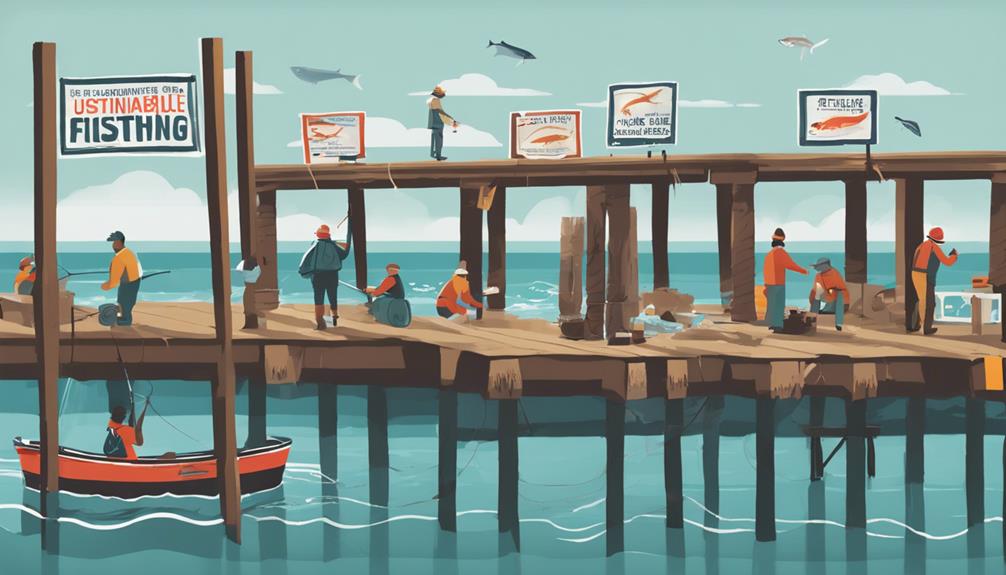You may think that the world's oceans are vast and endless, but the reality is that marine life is facing increasing threats.
Sustainable tourism has the power to transform the way we interact with the ocean and its inhabitants. By harnessing the potential of eco-friendly practices and responsible fishing initiatives, a unique opportunity arises to not only protect marine ecosystems but also to benefit local communities and economies.
The synergy between sustainable tourism and fishing conservation holds promise for a harmonious coexistence between humans and the ocean, ensuring a legacy of thriving marine environments for generations to come.
Importance of Sustainable Tourism
Embracing sustainable tourism practices not only benefits the environment but also enhances the overall experience for visitors. By focusing on economic growth while simultaneously protecting the environment, sustainable tourism creates a harmonious balance that fosters long-term benefits for both nature and local communities.
When tourism is managed sustainably, it can serve as a powerful tool for economic growth in the regions it touches. By conserving natural resources and promoting responsible practices, destinations can attract more visitors who are increasingly drawn to environmentally conscious experiences. This influx of tourists leads to increased job opportunities, stimulates local businesses, and ultimately drives economic development in the area.
Moreover, sustainable tourism plays a crucial role in environmental protection. By implementing measures to reduce carbon footprints, manage waste effectively, and preserve ecosystems, destinations can safeguard their natural surroundings for future generations. This not only ensures the longevity of the environment but also maintains the allure of the destination for tourists seeking authentic and unspoiled experiences.
In essence, the importance of sustainable tourism lies in its ability to strike a balance between economic growth and environmental protection. By embracing practices that benefit both aspects, destinations can create a thriving and resilient tourism industry that nurtures the planet while providing memorable experiences for visitors.
Benefits of Eco-Friendly Practices
To fully grasp the positive impact of sustainable tourism on both the environment and local economies, one must acknowledge the significant benefits that stem from implementing eco-friendly practices. Embracing eco-friendly benefits not only safeguards the natural resources and habitats but also enhances the overall tourism experience. By prioritizing sustainable tourism advantages such as reducing carbon footprints, conserving water, and promoting biodiversity, you contribute to the long-term health of ecosystems and wildlife.
When tourists engage in activities that prioritize eco-friendly practices, they support the preservation of marine life and coastal areas. Sustainable tourism benefits include minimizing pollution, protecting endangered species, and maintaining the delicate balance of marine ecosystems. By choosing eco-friendly accommodations, participating in responsible fishing practices, and respecting marine protected areas, you actively contribute to the conservation of fish populations and their habitats.
Furthermore, sustainable tourism advantages extend beyond environmental protection. By supporting businesses that prioritize eco-friendly benefits, you help boost local economies through job creation and community development. When fishing practices align with sustainability standards, it ensures a stable income for local fishermen and fosters economic growth in coastal regions. Your commitment to eco-friendly practices not only safeguards the environment but also strengthens the livelihoods of communities dependent on fishing industries.
Supporting Local Conservation Efforts
Start actively participating in local conservation efforts to make a tangible impact on preserving marine ecosystems and wildlife. By engaging with your community and forming partnerships with local organizations, you can contribute to the sustainability of fishing practices and protect the delicate balance of marine life. Here's how you can support local conservation efforts:
- Volunteer for Cleanup Events: Get involved in beach cleanups or underwater debris removal initiatives organized by local conservation groups. By helping to keep marine habitats clean, you directly contribute to the well-being of marine species and ecosystems.
- Attend Educational Workshops: Participate in workshops or seminars focused on marine conservation and sustainable fishing practices. This knowledge equips you to make informed decisions that positively impact local marine environments.
- Support Local Conservation Projects: Donate to or volunteer with organizations dedicated to marine conservation in your area. Your contributions help fund vital research, conservation efforts, and community outreach programs.
- Engage in Advocacy: Become an advocate for marine conservation by raising awareness within your community and encouraging others to join local conservation initiatives. Through collective action and community engagement, you can amplify the impact of conservation efforts and promote sustainable fishing practices.
Promoting Responsible Fishing Practices
By fostering a culture of accountability and sustainability, you can play a crucial role in promoting responsible fishing practices. Ethical fishing practices are essential for the long-term health of marine ecosystems. When engaging in fishing activities, always prioritize sustainable methods that minimize harm to marine life and habitats. This includes following catch limits, using selective gear to reduce bycatch, and respecting protected areas. By adhering to these principles, you contribute to marine protection and help preserve the biodiversity of our oceans.
Responsible fishing also involves proper waste disposal. Avoid littering or abandoning fishing gear at sea, as these actions can have detrimental effects on marine life. Dispose of trash appropriately and participate in beach clean-up efforts to keep coastal areas free of pollution. Additionally, support initiatives that aim to reduce plastic waste and promote recycling to safeguard the well-being of marine environments.
Educating yourself and others about the importance of ethical fishing practices is key to promoting sustainability. Stay informed about local regulations and guidelines concerning fishing activities, and encourage others to do the same. By raising awareness and advocating for marine protection, you can inspire positive change within the fishing community and contribute to the conservation of our precious marine resources.
Engaging Tourists in Conservation Initiatives
Get involved in conservation initiatives by actively engaging tourists in sustainable practices during their visits. By promoting tourist engagement and conservation awareness, we can create a positive impact on fishing conservation efforts. Here are four ways you can help make a difference:
- Educational Workshops: Host workshops or presentations for tourists to raise awareness about the importance of sustainable fishing practices. Provide information on local marine ecosystems, endangered species, and the impact of overfishing.
- Interactive Experiences: Offer hands-on experiences such as beach clean-ups, snorkeling trips to see marine life up close, or visits to conservation centers. These activities allow tourists to connect with the environment and understand the significance of conservation efforts.
- Promote Responsible Behavior: Encourage tourists to follow guidelines such as catch-and-release practices, respecting marine protected areas, and properly disposing of waste. By setting a positive example, visitors can actively contribute to preserving the marine ecosystem.
- Support Local Conservation Projects: Partner with local organizations or initiatives focused on marine conservation. Allow tourists to participate in or donate to these projects, fostering a sense of community involvement and long-term commitment to conservation efforts.
Through tourist engagement and raising conservation awareness, we can work together to protect our oceans and ensure sustainable fishing practices for future generations.
Enhancing Awareness Through Education
Enhance conservation awareness by providing interactive educational opportunities for tourists visiting marine environments. By incorporating educational programs into sustainable tourism initiatives, you can play a crucial role in raising awareness about the importance of fishing conservation. These programs can include guided tours led by marine biologists, interactive workshops on sustainable fishing practices, and informative sessions on marine ecosystems and the impact of overfishing.
One effective way to raise awareness is by organizing snorkeling or diving excursions that focus on showcasing the beauty of marine life and the delicate balance of the underwater world. Through these experiences, tourists can witness firsthand the importance of conservation efforts to protect the marine environment for future generations. Additionally, interactive educational programs can include visits to local fishing communities, where tourists can learn about traditional fishing practices and the challenges they face in today's changing world.
Educational programs can also highlight the role of marine protected areas in preserving fish populations and habitats. By explaining the benefits of these conservation zones, tourists can gain a deeper understanding of why sustainable imp fishing practices are essential for maintaining healthy marine ecosystems. Ultimately, by actively participating in educational initiatives during their visit, tourists can become ambassadors for fishing conservation and spread awareness in their own communities.
Collaborating With Conservation Organizations
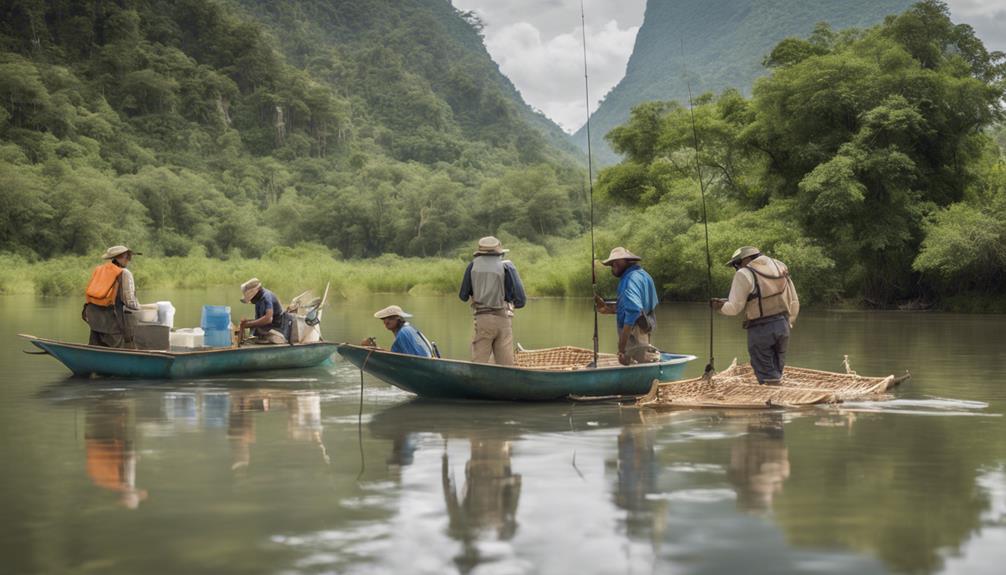
Working with conservation organizations can significantly boost the impact of sustainable tourism initiatives on fishing conservation efforts. By collaborating with these organizations, you can tap into their expertise and resources to enhance your conservation efforts. Here are four ways in which partnering with conservation organizations can help you make a greater positive impact:
- Access to Partnership Opportunities: Conservation organizations often have established partnerships with a wide range of stakeholders, including government agencies, NGOs, and local communities. By teaming up with these organizations, you can leverage these existing partnerships to amplify your conservation initiatives and reach a broader audience.
- Expertise and Knowledge Sharing: Conservation organizations typically have experts in various fields, such as marine biology, environmental science, and conservation management. By working with them, you can benefit from their knowledge and experience, gaining valuable insights that can help improve the effectiveness of your conservation projects.
- Community Involvement: Conservation organizations often have strong ties to local communities and indigenous groups. By partnering with them, you can engage with these communities more effectively, involving them in your conservation efforts and ensuring that your initiatives are culturally sensitive and inclusive.
- Resource Mobilization: Conservation organizations may have access to funding sources, grants, and other resources that can support your conservation projects. By collaborating with them, you can tap into these resources, increasing the financial sustainability of your initiatives and ensuring their long-term success.
Partnering with conservation organizations can't only enhance the impact of your sustainable tourism initiatives but also foster a more holistic and collaborative approach to fishing conservation.
Monitoring and Evaluating Conservation Impact
To effectively assess the impact of conservation efforts in fishing, implementing a robust monitoring and evaluation system is vital. Conservation monitoring plays a crucial role in ensuring that the measures put in place are effective in preserving fish populations and their habitats. By regularly evaluating effectiveness, stakeholders can make data-driven decisions to adjust strategies for better outcomes.
One way to monitor conservation impact is through data collection on fish populations and their trends. This information helps determine whether the implemented measures are leading to an increase in fish numbers or a healthier ecosystem. Tracking these changes over time provides valuable insights into the success of conservation efforts and highlights areas that may need further attention.
In addition to monitoring fish populations, evaluating the effectiveness of conservation efforts also involves assessing the socio-economic impact on local communities. Sustainable fishing practices shouldn't only benefit the environment but also support the livelihoods of those who depend on fishing for income. By measuring the social and economic outcomes of conservation initiatives, stakeholders can ensure that these efforts are sustainable in the long term.
Frequently Asked Questions
How Can Sustainable Tourism Help Boost Local Economies in Fishing Communities?
To boost local economies in fishing communities, sustainable tourism can bring economic growth and community development. Visitors engaging in eco-friendly activities can generate income for locals through accommodations, food, and services.
What Are Some Examples of Responsible Fishing Practices That Tourists Can Participate In?
When visiting fishing communities, you can engage in responsible fishing practices to support marine education and community engagement. Choose sustainable seafood options at local restaurants and markets.
Participate in responsible angling activities like catch-and-release fishing or joining guided fishing tours that prioritize conservation. By being mindful of your impact on the marine environment, you can contribute to the preservation of fish populations and the overall health of the ocean.
How Do Eco-Friendly Practices in Tourism Benefit Marine Ecosystems?
When you support eco-friendly practices in tourism, you help protect marine ecosystems like marine sanctuaries. By following fishing regulations and promoting ecotourism, you contribute to ocean preservation.
Your actions play a crucial role in ensuring the sustainability of these precious environments for future generations. So, embrace responsible tourism choices to make a positive impact on marine life and the overall health of our oceans.
What Role Do Local Conservation Efforts Play in Promoting Sustainable Fishing Practices?
Local conservation efforts are crucial in promoting sustainable fishing practices. Community involvement and conservation education play a significant role in raising awareness about the importance of preserving marine ecosystems.
By fostering local partnerships and implementing sustainable practices, these efforts help ensure the long-term health of fish populations and the overall well-being of the environment.
Together, these initiatives create a more sustainable future for both marine life and fishing communities.
How Can Tourists Get Involved in Conservation Initiatives Beyond Just Participating in Fishing Activities?
To get involved in conservation initiatives beyond fishing, you can engage in various activities as a tourist. Conservation volunteering offers a hands-on approach to help protect the environment. You can participate in beach clean-ups, tree planting, or wildlife monitoring programs.
Conclusion
In conclusion, by embracing sustainable tourism practices, you can play a vital role in boosting fishing conservation efforts. Supporting local initiatives, promoting responsible fishing, and engaging in conservation activities can make a significant impact.
By working together with conservation organizations and educating tourists, we can help protect our oceans and marine life for future generations. Remember, every action you take while traveling can make a difference in preserving our natural resources. So, choose eco-friendly options and be a responsible traveler.
